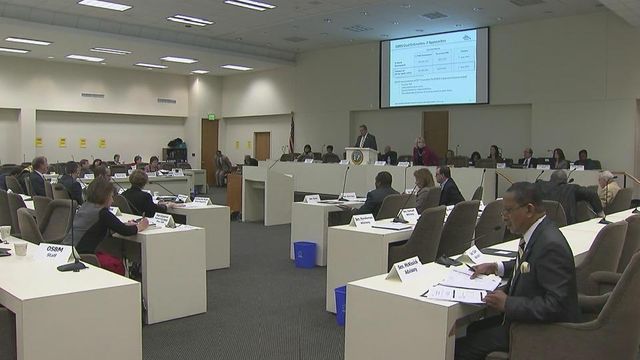Wos, senators spar over death records
In the latest chapter in their long-running feud, Senate leaders and DHHS Secretary Aldona Wos exchanged heated words over modernizing the state's archaic death records system.
Posted — UpdatedThe heated exchange between Sen. Tommy Tucker, R-Union, and Secretary of Health and Human Services Aldona Wos is just the latest skirmish in an intensifying feud between Senate leaders and Gov. Pat McCrory's administration.
As part of their planned reports to the Joint Legislative Oversight Committee on Health and Human Services, Wos and her team from the Vital Records Division gave a presentation calling for the modernization of North Carolina's outmoded death records system.
North Carolina's birth records system is fully electronic, but its death records are still processed and transferred in hard copy using a system that dates back 84 years.
According to DHHS, North Carolina is one of only six states still using handwritten, typed, mailed documents. About 83,000 people die every year in the state.
State Registrar Catherine Ryan told lawmakers the current process for certifying a death is "very cumbersome.”
The funeral director fills out most of the death certificate, with input from the medical examiner where needed. It then goes to a medical professional for certification of the cause of death. Then it goes to the county health department, which finishes filling out the certificate and keeps a copy for its own records. After that, the original goes to the state vital records office in Raleigh, where the accuracy of the record must be verified.
Each transfer of the document is either manual or by U.S. mail. By the time the certificate has worked its way to Raleigh, the process can take 90 days or longer. Estates cannot be filed in court until the certificate is completed.
"Some of our key technology is about a decade behind the rest of the nation," Wos told lawmakers. "Our customers – our citizens – do not receive the records they need in a timely fashion."
According to Ryan, upgrading the system would improve the turnaround time to seven days or less. It also would keep sensitive personal information more secure from identity thieves or scammers, she said, and would better allow the state to track and respond to emerging public health threats.
Also, it would bring in more money from the federal Social Security Administration, which Ryan says would reimburse the state $3.01 for each timely submitted electronic death certificate, much more than the current rate of 84 cents each.
However, that increase wouldn't cover the price of a new system. Reese Edgington, information technology project management director for DHHS, estimated a commercially developed system would cost around $5.8 million, plus $427,000 a year for support. A system developed in-house would be slightly cheaper, but support costs would be higher in the long run and it would take longer to put into place.
Ryan and Edgington said the upgrade would probably allow DHHS to "redirect" three or four staffers, saving $140,000. But they couldn't immediately say how much the manual system is costing, in part because much of the work is done by non-state employees.
Tucker said he thinks more positions could be eliminated, and he blasted Ryan and Edgington for not having more specific numbers.
"When businesses go to software, they want to see savings," he said.
"Senator, the reason to do this is not a matter of saving money on one or two or 10 or 50 salaries. This has to be done for the future of the state," Wos responded vehemently. "It’s simply the right thing to do toward our citizens.
"Citizens have a right to have a birth certificate and a death certificate in a reasonable amount of time," she added, saying the current system "does not pass the common sense test.”
"Don't talk down to me," Tucker retorted. "I'm responsible to the taxpayer to see if there's any savings."
"We will continue to give you whatever information you like," Wos answered. "We will present our business case more accurately if this was not sufficient. "
"I would suggest, when you make these presentations to this committee, you have the final data," Tucker shot back. "We need something from a business analysis standpoint."
Related Topics
• Credits
Copyright 2024 by Capitol Broadcasting Company. All rights reserved. This material may not be published, broadcast, rewritten or redistributed.






